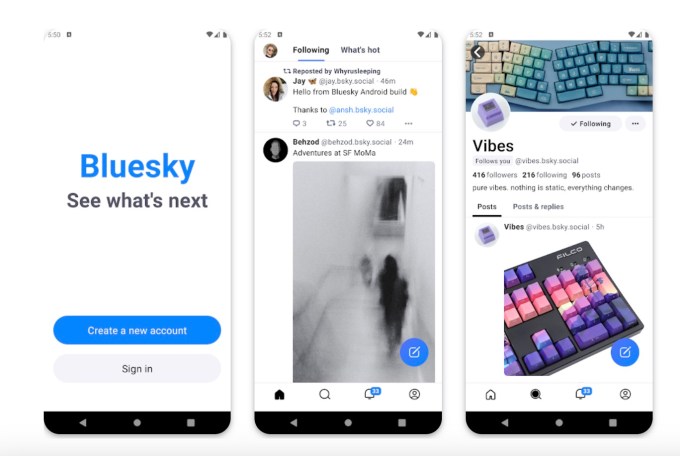Looking to leave the Twitter ecosystem? Bluesky, the Twitter alternative backed by Twitter co-founder and CEO Jack Dorsey, has now rolled out to Android users. The app, which promises a future of decentralized social networking and choose-your-own algorithms, initially launched to iOS users in late February and remains in a closed beta.
The exclusivity is driving demand for the newer social network to some extent, but so is having Dorsey’s name attached. For many, Bluesky represents the hope of a Twitter do-over — where the core concepts around short-form posts and a shared timeline remain, but the problems around moderation and centralized control are addressed.
Bluesky aims to give users algorithmic choice, letting them eventually choose from a marketplace of algorithms that let them control what they see on their own feed, instead of having it controlled by some central authority.
At launch, however, Bluesky remains a pared-down version of Twitter without many of the features that make the social network what it is today, including basic tools for tracking likes or bookmarks, editing tweets, quote-tweeting, DM’s, using hashtags and more. It’s also building in decentralization with its own protocol — the AT Protocol — instead of contributing to the existing work around ActivityPub, the protocol powering the open source Twitter alternative Mastodon and a range of other decentralized apps in the wider “Fediverse” — the name for these interconnected servers running open software used for web publishing.

Image Credits: Bluesky
That puts Bluesky on the outside of where a lot of the current activity is taking place around decentralized social networking.
Though Mastodon has been criticized for being overly complicated or having bad vibes, at times, the protocol behind it has inspired a wave of new development following Elon Musk’s chaotic Twitter takeover. Former Twitter app makers turned their attention to the social network after Musk unceremoniously cut off their access to Twitter’s API, having newly launched polished Mastodon clients like Ivory and Mammoth. Flipboard and Medium have also taken active roles in the community, setting up their own Mastodon servers, and Tumblr has been weighing its options.
Despite its challenges, demand for Bluesky seems to have been picking up. Anecdotally, it felt as if there was increased demand for Bluesky access over the past couple of weeks, thanks in part to Bluesky’s waitlist system and the limited number of invites available. The network recently let in more users and now claims to have a small user base of around 20,000.
Demand for Bluesky may be even higher, however. According to app intelligence firm data.ai, Bluesky has seen 240,000 lifetime installs on iOS, 135,000 of which were just this month, up 39% from March’s 97,000.
With the app’s arrival on Android, it’s clear Bluesky wants to grow that number further.
What’s not clear is how Bluesky’s future development will be funded. Last year, Bluesky received $13 million as it spun out from Twitter, ensuring it had the freedom and independence to get started on R&D. Jack Dorsey continues to sit on its board but also devotes his time to other projects, like Nostr, in addition to running Block. And it’s not likely that Musk’s Twitter will continue to fund its competitor — in fact, it’s crazy that Twitter’s own board ever allowed this in the first place!
That could put Bluesky in a position where it will, at some point, need to raise further capital, putting it in competition with other Twitter alternatives looking for financial backing from investors. In addition to Mastodon, T2, Spill, Post and others are now trodding down this same path, hoping to lure disgruntled users to their own app ecosystems. But that means the Twitter diaspora may not find a “new Twitter” in the end, but dozens of smaller communities offering a Twitter-like experience instead.
Jack Dorsey-backed Twitter alternative Bluesky hits Android by Sarah Perez originally published on TechCrunch







